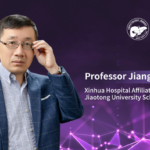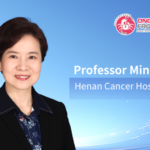
Editor's Note: At the 2024 American Society of Clinical Oncology (ASCO) annual meeting, a multi-center study led by Professor Jin Li from Shanghai GoBroad Cancer Hospital, China Pharmaceutical University, reported that utidelone demonstrated significant anti-tumor activity in various pre-treated advanced solid tumors, particularly in first-line treatment of advanced gastric cancer. Oncology Frontier invited Professor Jin Li to further interpret the study.Oncology Frontier: The first phase of the study primarily used utidelone monotherapy, including pre-treated patients. The second phase gastric cancer cohort focused on first-line treatment patients, with the treatment regimen adjusted to a combination immunotherapy strategy. What is the background and significance of the second phase design?
Professor Jin Li: In the first phase of the study, we observed the anti-tumor activity and safety of utidelone, indicating its potential for expanding to front-line treatment studies. In recent years, advanced gastric cancer has entered the “precision treatment” era, allowing for targeted or immunotherapy choices based on HER2 expression, dMMR/MSI-H status, and PD-L1 CPS. Immunotherapy combined with chemotherapy has become the standard first-line treatment for HER2-negative advanced gastric cancer. There is a consensus on the synergistic effects of chemotherapy and immunotherapy, which can improve efficacy but often come with higher toxicity.
Utidelone’s mechanism of action, preclinical study results, and good clinical safety profile suggest its potential synergistic advantages with PD-1 inhibitors and other chemotherapies. Compared to other chemotherapeutic agents, utidelone has several unique advantages, including:
- It does not bind to P-glycoprotein on the cancer cell membrane, avoiding the issue of active drug components being pumped out of the cell, thus maintaining drug concentration and sensitivity in multidrug-resistant tumors, including those resistant to taxanes.
- In addition to targeting microtubules, it can mediate apoptosis, with broader and stronger anti-cancer activity than paclitaxel.
- Its unique physicochemical properties allow it to pass through the blood-brain barrier, offering potential for preventing and treating brain metastases.
- It has a good safety profile, with significantly lower hematologic toxicity rates compared to similar chemotherapeutic agents, and mild liver and kidney toxicity.
Therefore, in the second phase, we explored the feasibility of using utidelone combined with sintilimab and oxaliplatin as first-line treatment for advanced gastric cancer. The preliminary results show promising efficacy and safety, comparable to or even better than historical studies. If future large sample randomized controlled trials (RCTs) confirm these findings, utidelone may become a new option for immunotherapy combinations, providing patients with more effective and less toxic treatment options.
Oncology Frontier: The second phase gastric cancer study is still recruiting. Based on the current results, what practical guidance do you think this study will provide for gastric cancer treatment? What are your expectations for future data?
Professor Jin Li: The second phase gastric cancer cohort is still recruiting, and this ASCO meeting reported data from 11 evaluable patients, showing promising efficacy and safety of utidelone combined with sintilimab and oxaliplatin as first-line treatment for advanced gastric cancer, with all patients achieving PR or SD, which is very encouraging. We hope that the efficacy will be sustained with an increased sample size. In the future, we plan to conduct larger sample phase III studies to further confirm its efficacy and safety. If we achieve the current efficacy rates in phase III studies, this regimen may become a standard first-line treatment option.
China accounts for about 43% of global gastric cancer cases, with nearly half diagnosed at an advanced stage, making curative surgery impossible. If we can shrink tumors in over 70% of patients, many previously unresectable cases may become resectable, greatly increasing the chances for curative surgery. After achieving curative resection, patients can receive appropriate adjuvant therapy, significantly increasing the possibility of cure, which is our long-term goal. Our aim is not only to prolong PFS and OS but also to provide the best tumor control and increase opportunities for curative resection.
For patients whose tumors significantly shrink but remain unresectable, we hope to control the disease through palliative resection or local treatments (such as stereotactic body radiotherapy, cryoablation, radiofrequency ablation), thereby significantly extending OS and improving the 5-year survival rate of gastric cancer, which is our long-term vision.
We sincerely hope that this study will receive strong support from the medical community nationwide, working together to complete future large phase III RCT studies. The current study is only our initial exploration, and we plan to apply this treatment strategy to other solid tumors such as esophageal cancer, cholangiocarcinoma, and ovarian cancer in the future. As a novel drug, utidelone shows great development potential and value. We look forward to collaborating with scientists in the field to further explore its clinical applications, aiming to extend patient survival and bring more possibilities for cure.


